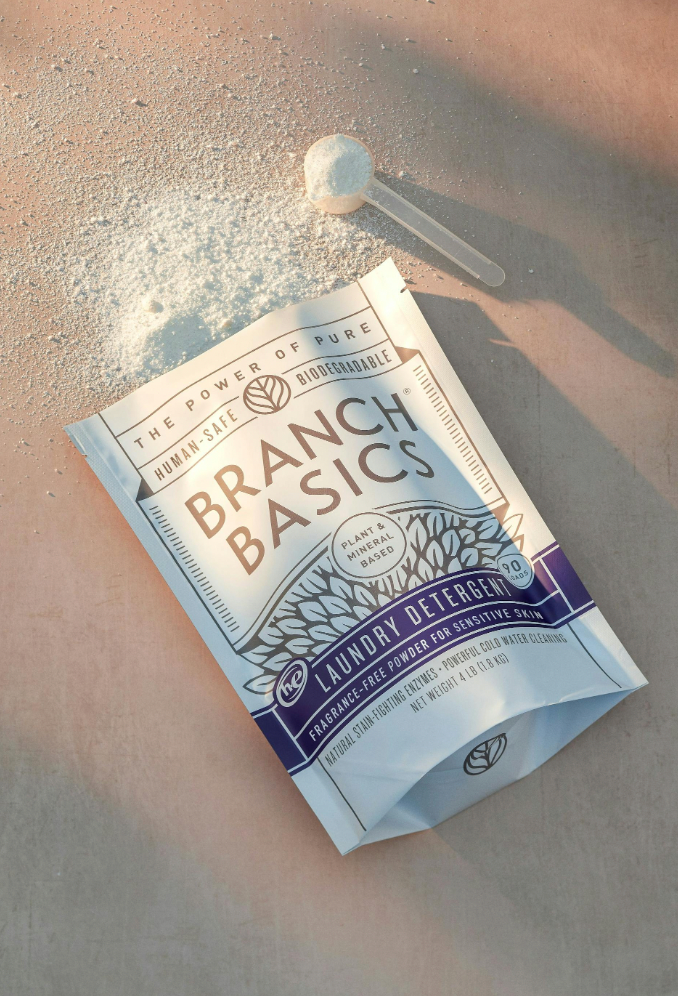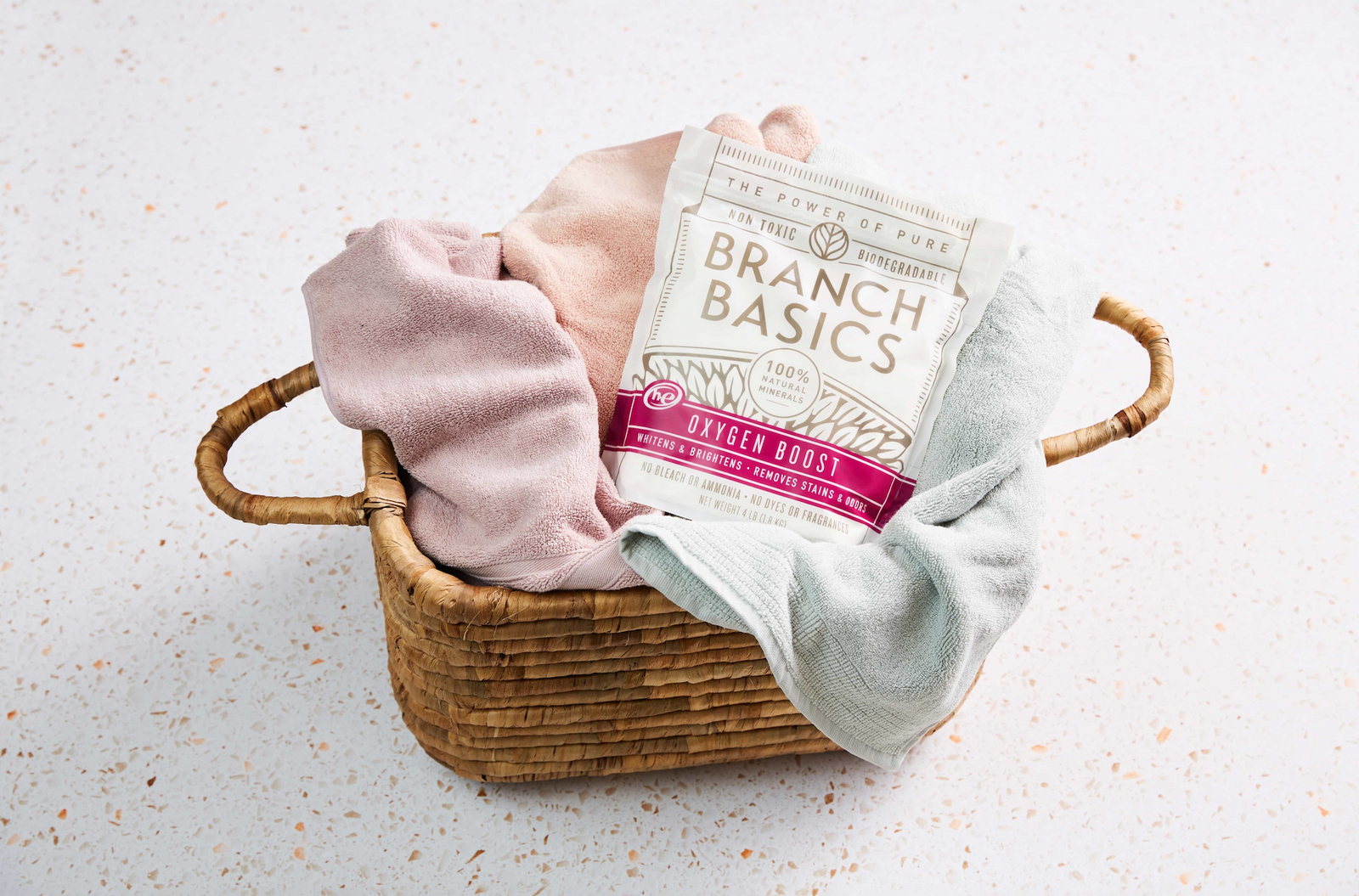Is Natural Laundry Detergent Better?

If mounting reports about the dangers of synthetic chemicals and fragrances in laundry products have you rethinking your favorite detergent, this article is for you!
Here, we’ll compare conventional laundry detergents to natural laundry detergents so you can decide what’s safest and healthiest for your family.
Natural vs. Synthetic Chemical Laundry Detergent: What’s the Difference?
For far too long, the laundry product industry has led us to believe we need a costly synthetic chemical concoction of pre-treaters, detergents, boosters, fabric softeners, bleach, deodorizers, and dryer sheets to have clean clothes.
Not only do these products create serious health and environmental hazards (more on this to come), but the majority of them are completely unnecessary.
Fortunately, consumers are catching on to this and looking for simpler, safer, gentler alternatives.
However, reading laundry product labels can be confusing, especially if you’re new to the natural laundry game.
Benefits of Natural Laundry Detergent
We’ve already mentioned many benefits of choosing natural laundry detergents. Here’s a recap and a few more.
Natural Laundry Detergent Has Less Environmental Impact
Synthetic chemical laundry products are a disaster for the environment because they go right down the drain and into our soil and waterways, while their toxic synthetic fragrance (which can contain hundreds of synthetic chemicals!) gets into our indoor and outdoor environments, degrading air quality.
Ingredients like bleach, optical brighteners, phthalates (found in synthetic fragrance), microplastics, synthetic surfactants, various forever chemicals, preservatives, VOCs, and dozens of others are considered unsafe for the environment and humans.
By choosing natural laundry detergents, you can prevent thousands of pounds of harmful synthetic chemicals from entering the environment in your lifetime.
Natural Laundry Detergents Are (Generally) Allergy-Friendly
Skin irritation, and allergies are two of the main reasons people switch from synthetic to natural, fragrance-free laundry detergents.
However, even some natural ingredients, like certain enzymes or “natural fragrance,” can irritate sensitive skin.
We highly recommend choosing naturally fragrance-free laundry products rated 1-2 on EWG if you have skin allergies and testing for compatibility.
In addition, natural laundry products do not release allergen-triggering VOCs and other synthetic chemicals, like fragrance, that can cause or trigger sneezing, wheezing, bronchitis, itching, rashes, or other respiratory disorders.
Natural Laundry Detergents Are Economical
It is unbelievable how expensive laundry detergent has become!
What’s even more unbelievable is how much we’re willing to pay for these artificial chemical concoctions that are polluting our homes, bodies, and the environment.
To be fair, there are natural laundry detergents that are equally or more expensive than conventional brands.
However, switching to natural, human-safe laundry products doesn’t have to cost a fortune and should save you money in the long run.
We discuss the best human-safe (and economical) alternatives to commercial laundry detergents, including Branch Basics Laundry Detergent, soap nuts, and even vinegar, in: 9 Laundry Detergent Alternatives That Actually Work.
Natural Laundry Detergents Are Safer
We’ve all heard the horror stories of babies, toddlers, children, and pets accidentally ingesting toxic laundry pods or experiencing some other accidental exposure to bleach, detergents, or other toxic products.
It is absolutely heartbreaking and completely preventable. Toss the toxins in the laundry room in favor of natural laundry products.
This seems like plain common sense, especially for families and pet owners.
However, we have been conditioned to believe these products are safe, effective, and essential, which makes us forget how harmful synthetic cleaning chemicals can be—in cases of acute exposure and via their long-term effects.
It’s been said that it’s the small things we do that make the most significant impact.
By switching from synthetic chemical to natural laundry detergents, you’re taking a powerful step to protect the safety and long-term health of yourself, your children, your pets, and the planet.
Tips on Avoiding Greenwashing When Choosing a Natural Laundry Detergent
Greenwashing, the knowing act of making a product appear safer and more environmentally friendly than it really is, is prevalent in the cleaning and laundry products industries.
Laundry-specific examples include labels like:
- Fragrance-free: This label gives the illusion of a safer, more natural laundry product when in reality, most are made using additional synthetic fragrance-masking chemicals.
- Made with “natural” or “organic” ingredients: This can mean a product is made with all or mostly natural or organic ingredients, or it’s made with just a tiny bit of something natural or organic mixed in with mostly toxic synthetic chemicals.
- Contains enzymes: Enzymes are wonderful for stain removal, and are typically safe. However, that doesn’t mean the rest of the formulas are all-natural or safe.
- Naturally derived: This term suggests ingredients have been derived from a natural source (plant, mineral, animal, etc.). However, that doesn’t mean they haven’t been adulterated. Adulteration doesn’t necessarily make an ingredient toxic, as is true for some coconut-based glucoside surfactants (more on this to come). However, in some cases it does create a toxic product.
- Sustainable: This terminology generally refers to a product’s environmental impact, not where it is human safe.
Other greenwashing techniques include clever branding that makes a product appear safe and/or natural.
Some examples include pictures or graphics on labels of teddy bears, babies, waterfalls, animals, forests or packaging that appears green or nostalgic.
This is why we always recommend vetting your laundry products (and cleaning and skin care products) using tools like EWG’s Cleaning Products database. Just plug in the name of the products or scan the barcode, and EWG will rate it for toxicity and safety on a scale of “1” (least toxic) to “10” (most toxic”).
Get educated on the most toxic ingredients to avoid in laundry products in: How to Toss Your Toxic Laundry Detergent.
Common Ingredients Used in Natural Laundry Detergent
Now that you know how to vet a conventional versus natural laundry detergent, we’ll dig a little deeper into the ingredients.
Specifically, we’ll look at common ingredients used in natural laundry detergents and laundry boosters like surfactants (ingredients that reduce the surface tension of water and act as foaming, emulsifying, degreasing, and thickening agents), brighteners, enzymes, and bleach alternatives.
Decyl Glucoside
If you’re thinking that decyl glucoside does not sound like a natural product, you’re partially right.
Here’s why decyl glucoside is common in natural laundry detergents and cleaning products.
Decyl glucoside is a naturally-derived surfactant from coconut or corn.
Glucosides, like decyl glucoside and others we’ll discuss in this section, are technically considered synthetic because of the processing of alcohols involved.
However, they are considered safe, rated “2” on EWG, and naturally derived products.
Decyl glucoside is suitable for the most sensitive and delicate skin and is commonly used as a safe alternative to conventional anionic surfactant sulfates (like sodium lauryl sulfate and sodium laureth sulfate).
It is an extremely mild, natural, vegan, plant-derived, biodegradable, safe, and sustainable surfactant derived from corn or coconuts.
Decyl Glucoside produces less stable foam than Coco Glucoside but is excellent for enhancing viscosity.
Learn more about this plant-derived surfactant in: Decyl Glucoside: What Is It And Is It Safe For Your Skin?
Coco Glucoside
Coco Glucoside belongs to the Glucoside family of plant-derived surfactants and is sourced from coconuts.
Its safety and versatility as a nonionic surfactant make it a common surfactant in many healthy cleaning, laundry, and personal care products.
Coco glucoside’s functions include acting as a:
- Sulfate-free foaming agent
- Cleanser
- Conditioner
- Moisturizer
- Natural emollient
- Skin softener
Coco Glucoside is rated a “2” by the Environmental Working Group, is 100% biodegradable, non-GMO, and considered “low risk” for development and reproductive health, and is appropriate for sensitive skin, irritated skin, or allergies.
We actually combine Coco Glucoside with Decyl Glucoside in Branch Basics to maximize foaming and cleansing power.
Sodium Citrate
Sodium citrate is a plant-derived, biodegradable sodium salt of citric acid that acts as a water softener, cleaning agent, descaling agent, pH regulator, and preservative.
It typically comes from citrus fruits, molasses, or corn and is manufactured as a powder.
Sodium citrate is a common ingredient in many natural cleaning products, including Branch Basics, as well as food and beverages, skin care, oral care, cosmetic, baby care, hair care, and medical products.
It is rated a “1” by the Environmental Working Group, is a non-irritant, and is allowed in “Made Safe” products.
The FDA has granted sodium citrate Generally Recognized As Safe (GRAS) status. However, as mentioned in previous articles, many questionable products have been given GRAS status, so never use this as your sole safety measure.
Sodium citrate is used to help break up grease, dirt, and grime, act as a water softener, natural preservative, and laundry sequestrant (which improves the power of laundry soaps by reducing ion levels in water).
Get more details in: Sodium Citrate For Cleaning.
Sodium Bicarbonate
You may recognize this name as Sodium Bicarbonate is the chemical name for Baking Soda.
Baking Soda is used in laundry detergents and human-safe laundry boosters and stain removers, like Branch Basics Oxygen Boost, as a pH regulator, natural bleach alternative, water softener, stain remover, and deodorizer.
Sodium Percarbonate
Sodium percarbonate is a white powder made from sodium carbonate—also known as washing soda or soda ash and hydrogen peroxide—a natural bleaching agent.
Also known as “oxygen bleach” or “powdered peroxide,” sodium percarbonate releases a mixture of oxygen, water, and washing soda when added to water, making it an excellent cleaning and laundry agent.
Sodium percarbonate has antibacterial, antifungal, anti-algae, anti-mold, and deodorizing properties and is rated 1-2 for “low toxicity” on the Environmental Working Group database.
It’s also one of the main ingredients in:
- Branch Basics Laundry Detergent as a healthy alternative to bleach for effective stain removal and natural brightening, the same goes for Branch Basics Oxygen Boost!
- And Branch Basics Dishwasher Tablets for powering through stuck-on food while cleaning and disinfecting dishes without harmful synthetic residue.
Get more facts on Sodium Percarbonate plus tips on how to use it in: The Power Of Sodium Percarbonate For Cleaning.
Enzymes: Proteases, Lipases, Amylases, Cellulases
Enzymes are popular in synthetic and natural laundry detergents because they act as detergent boosters, are targeted for specific stains, make detergents more efficient at cleaning in cold water, and help protect fabrics from wear and tear.
The main enzymes in laundry detergents include proteases, lipases, amylases, and cellulases.
Enzymes in laundry detergents are generally very safe, receiving a B+ from the Environmental Working Group and GRAS status from the FDA.
Depending on their intended use and formulation, many are also allowed in EWG-verified products, like Branch Basics Dishwasher Tablets.
Remember, just because a detergent contains enzymes doesn’t necessarily mean it’s safe and natural.
Does Natural Laundry Detergent Work?
There is a myth that natural laundry detergents cannot work better than synthetic because they don’t contain harsh synthetic chemicals and detergents.
That is simply not true.
The key to finding an effective natural laundry detergent is to look for products containing the ingredients listed above. This helps ensure a powerful, human-safe cleaner that will do the job as well, if not better, than synthetic laundry products.
In addition, many commercial laundry detergents contain synthetic chemical fabric softeners, optical brighteners, and bleach, all of which are ultra-toxic and degrade fabrics over time.
A lose-lose situation for consumers!
Toss the Toxins With Branch Basics
Has this information got you fired up to switch to natural laundry detergent?
We’ve said before the laundry room is often the most toxic room in the home, which is why we typically recommend starting there in a healthy home detox.
Our Laundry Detergent powder is incredibly convenient and simple to use, requiring just one scoop per load with no additional products needed. This product has passed the highest bar of safety in the industry and was thoughtfully formulated with your health in mind. It does not contain synthetic fragrance, dyes, optical brighteners, ammonia, chlorine, endocrine disruptors or 1,4-dioxane. It excels in stain removal, odor elimination, and fabric preservation, streamlining your laundry routine.
Plus, it's good for the earth! This powder is biodegradable, septic-safe and prevents toxic runoff. Because it performs excellently in cold water, it saves energy and protects your fabrics. Learn more about our human-safe Laundry Detergent here.
We also offer natural laundry accessories like Wool Dryer Balls (the ultimate alternative to synthetic dryer sheets) and a Natural Scrub Brush for handwashing and stain removal.
For more helpful advice on tossing the toxins in your laundry room and switching to natural laundry products, see:

Marilee Nelson
Marilee Nelson is an Environmental Toxins expert who has spent nearly 30 years advocating for the chemically-sensitive and chronically-ill. She is a Board Certified Nutritionist, Certified Bau-Biologist and Bau-Biology Inspector and specializes in Food As Medicine. She has helped thousands of families and individuals identify, heal and recover from toxic exposures and is on a mission to revolutionize the way American families view their health.








